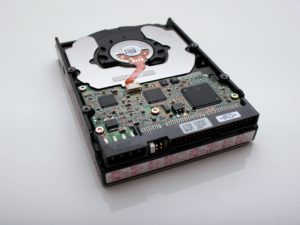Slow computer? – an easy solution.
April 25th, 2019 Posted by Damian Upgrades 1 thought on “Slow computer? – an easy solution.”
How many of you have experienced that irritating wait when booting your computer or waiting for an application to launch?
You’re not alone, many of us have, at some point, suffered this. Unfortunately, Windows in all its various incarnations, tends to slow down over time.
No one really knows why this happens, and a full re install of Windows can usually alleviate the problem, for a while anyway.
It tends to happen after a few years, and even after a couple of years on a well specified machine running Windows 10, (my own family PC!).
It should not have happened, the machine has a high-end CPU, plenty of RAM and no games or other 3rd party software slowing it down. The main software installed is Office 365 only. This got me wondering what could be behind the slow down. A little bit of investigation later and I had identified the culprit. The 3TB hard drive, which was hardly full at all, a paltry 220GB used out of the 3TB.
There was nothing wrong with the drive per se, but it was getting a lot of use from Windows 10, even in an idle state. I had checked to make sure there were no sneaky non-Windows processes running in the background. I could only conclude that Windows 10 itself accesses the drive regularly in its operation.
So why don’t all Windows 10 machines run slowly then I hear you ask.
Quite simply it is down to the type of storage drive used where Windows is installed. Most average machines with a reasonable amount of storage use traditional hard drives with a magnetised spinning platter and arm, like the one pictured above. In speed terms of modern CPUs and RAM, this is actually a bottleneck. The necessary mechanical action of the hard drive internals is slow compared to the rest of the system. This causes data transfer to be slowed down comparatively.
The solution is simple, replace the old mechanical technology drives (HDD) with newer solid-state drives or SSDs as they are known. These solid-state drives have no moving parts and run at the same speeds as the rest of the system. Thus not causing any slowdown of data transfer.
Once upgraded to SSD you will see much reduced boot up times and speedier opening of applications on your system. Older systems really do benefit. Previously where start up could take several minutes it could now be ready to go in under 30 seconds.
What’s the catch I hear you say.
Well there is always something, and the cost per GB of storage space is higher for SSDs than HDD. However, over the last 8-12 months prices of SSDs have dropped dramatically. Typically, a 1TB HDD will cost around £40 on average, whereas, a 1TB SSD will be over £100.
However, most people I encounter only use a fraction of the capacity of their drives, myself included. Therefore, it is not necessary to replace a 1TB HDD with a 1TB SSD, a lower capacity will suffice, thus reducing the cost dramatically.
Typically, a 128GB SSD will come in around £30 and a 256GB around £60. Much more affordable when revitalising an older computer.
I’ve done lots of these upgrades over the last twelve months. The reaction when people see how quickly their computer now responds is brilliant.
If you want to know more then please get in touch.
Thanks,
Damian.

